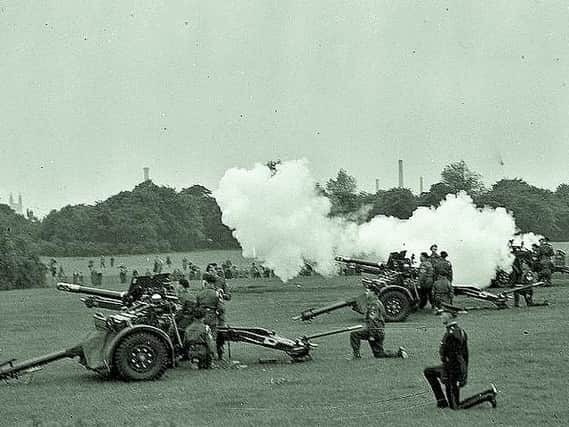Preston bombardier dies after accident during salute of seven guns


Headed by their military band, playing a lively quick step, they marched to the Preston railway station, where a special train was awaiting them. About one o’clock the train moved off carrying, in addition to its load of artillery men, about 400 townsfolk who were anxious to see the military preparations, including the firing of shot and shell.
On arrival at Kirkham the corps were quickly formed under the command of Major Birchall and marched through the town to Warton, a distance of four miles in just over an hour. On nearing the battery, a field officer’s salute of seven guns was in course of being fired by a detachment already there. What was to follow casts a dark gloom over soldiers and spectators alike.
Advertisement
Hide AdAdvertisement
Hide AdThree of the guns of the salute had already been fired, and Bombardier John Ashley, of the Coast Brigade of Artillery, who was a drill instructor to the Corps, was in the act of ramming down the charge, a blank cartridge, of the fourth, in one of the guns that had been fired, when the charge exploded.
The rammer shot out of the gun, Ashley’s fingers on his left hand being shot away leaving only his thumb, his right arm being broken, his face blackened and disfigured, and his clothing set alight. The unfortunate young man was in a shocking sight being carried into the Guide’s House almost lifeless.
Mr. W.H. Spencer, surgeon to the corps, who accompanied them to the ground, was immediately in attendance along with Dr. Shaw of Kirkham. They used all their skill to mitigate his pain and to save the life of Ashley, aged 32, who had served for 17 years.
The shocking occurrence and unfavourable weather led to the cancellation of any practice and after partaking of refreshments in a sombre mood the corps returned to Preston, as they marched to Kirkham for their train the band remained silent.
Advertisement
Hide AdAdvertisement
Hide AdOver the weekend the medical men treated Ashley, who had also suffered burns to his legs and thighs, and he rallied sufficiently to be transported to the House of Recovery in Preston.
He was very much in a delirious state, but able to have visits from his wife, child and military men, including Major Birchall.
By Tuesday he was able to talk of the accident, admitting his folly in having neglected so necessary a precaution as sponging a gun before reloading, and talked of the court martial he would likely face for breaching regulations.
Sadly, on the Thursday he took a turn for the worse and began to spit blood from the apparent ulceration of his lungs. A couple of difficult days followed and when he developed lockjaw. The end was near and he passed away on the following Sunday.
Advertisement
Hide AdAdvertisement
Hide AdOn Monday afternoon Mr. Miles Myres, the Coroner, held an inquest at the Preston police court. A number of Ashley’s military colleagues gave evidence and it was apparent that despite warnings that the gun needed sponging he completely ignored the advice. Corporal Pilling telling the court that after he threw in the cartridge, he quickly jumped out of the way in fear of trouble.
In summing up, the Coroner asked the jury to consider if anything should be inserted in the verdict regarding the apparent neglect by the deceased. The jury after their deliberations replied in the negative and a verdict of ‘Accidental Death’ was recorded.
On the Wednesday, the body of Ashley was interred in Preston Cemetery with full military honours.
The Preston Artillery Corps marching to the cemetery with the body placed on a gun carriage and covered with the union jack.